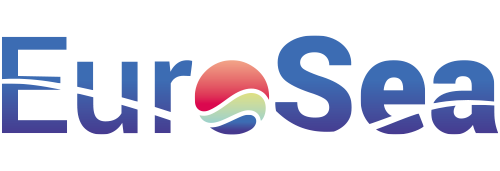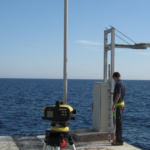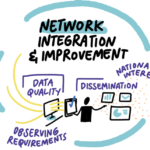The EuroSea week ran from 18 to 22 January 2021 bringing together over a hundred experts participating in the project as well as invited speakers from related global and European initiatives.
The European Commission DG Research Innovation shared their aspirations and stressed the important role of EuroSea in helping to improve ocean knowledge and sustainability. The newly established G7 European Office, hosted by Mercator Ocean International in Toulouse, France, shared their plans in relation to the G7 Future of the Oceans and Seas Initiative. Presentations were given from international and European ocean observing coordination programmes and initiatives including the Global Ocean Observing System (GOOS) – programme under the UNESCO-IOC, the Integrated Marine Observing System (IMOS) – the GOOS Regional Alliance in Australia, and the European Ocean Observing System framework led by EuroGOOS and the European Marine Board.
The EuroSea work packages presented the progress made during the first 14 months of the project, aiming at better coordinating European ocean observing and forecasting. Special emphasis was made during the week on the EuroSea impact assessment. The protocol put forward by leaders of work packages 1 (governance) and 8 (engagement, dissemination, exploitation & legacy) consists of determining key EuroSea impact areas and developing a pathway to analyze impacts within each of them, which are possible to measure or to illustrate. EuroSea impacts span coordination, decision support, science, and operational services, with many innovations planned along the way. The best practices collected during the project will be transferred to the global oceanographic community through the IOC Ocean Best Practices System.
Diversity and inclusion were another special emphasis of the week, with the EuroSea Gender and Diversity Board presenting the first results of both an institutional and a personal survey of the EuroSea partners. At a subsequent thought-mapping session, participants shared the way forward for EuroSea on topics of gender, diversity, career, and culture as linked with the scientific and innovation work of the project and its community.
Four scientific lunches were hosted during the week with seven presentations highlighting a range of EuroSea tasks, from data collection to data products and services or network coordination mechanisms.
10 European projects relevant to the goals of EuroSea were invited to highlight their efforts in flash talks. These are: EUMarine Robots, NautilOS, Eurofleets+, Jerico-S3, OceanPredict, ODYSSEA, iAtlantic, AtlantECO, Mission Atlantic, and Blue-Cloud. Collaboration between EuroSea and some of these projects has already been initiated through the European Commission’s Horizon Results Booster service.
The General Assembly concluded the week with the Executive Board elections, plans for the project’s Exploitation Strategy, and a discussion on the recommendations from the EuroSea International Scientific and Technical Advisory Board.
View the week’s agenda here.


